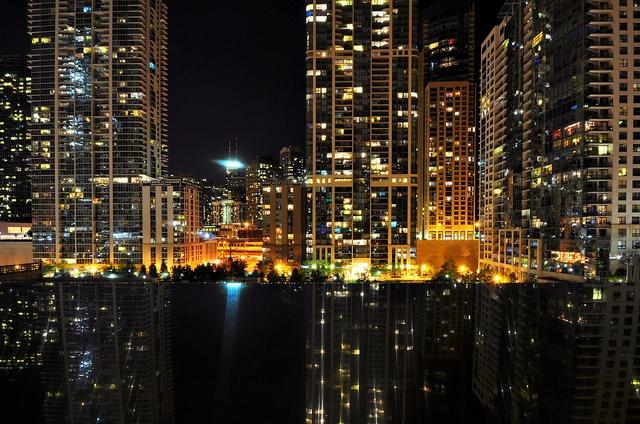
This is a little ironic; no, it’s more than a little ironic. Congress won’t act on climate change for fear of adversely impacting businesses. So, cities and states are picking up the slack, taking aggressive action, in order to protect their… wait for it…businesses.
A new report entitled Protecting Our Capital, released by the CDP, claims most cities recognize that climate change poses a considerable risk to their local businesses and therefore their economy and well-being. Of course, it’s only a small fraction of businesses that are actively lobbying against climate action -- mostly those in the fossil fuel industries who have the most to lose. Most of them now acknowledge the problem and, even as they hope to slow government action, are moving to address the challenges.
The report, which is based on responses from 207 cities, documents the recognition of the interdependence between cities and businesses. Of those surveyed, 76 percent of cities said that climate change could impact business, while businesses said that 75 percent of their biggest climate-related risks could also be seen as threats to their respective cities.
What kinds of risks are they talking about? These could include rising insurance costs, loss of tourism, supply chain issues and a lack of raw materials. Drivers of these costs will stem from storms and flooding, sea level rise, temperature increases, drought, and other weather-related disruptions and destructions.
A total of 757 carbon reduction drivers were reported.
Notably, the cities of Denver (U.S.), London (U.K.), Madrid (Spain), Durban (South Africa) and Taipei (Taiwan) combined to reduce their emissions by a total of 13.1 million tons CO2-equivalent since 2009. That’s a 12 percent reduction.
Joint efforts between businesses and cities include:
- Fire risk management and water monitoring (Sempra Energy/San Diego)
- Water management and flood preparedness (Sabasep/Careiras Brazil)
- Flood defense and infrastructure resilience (CLP/Hong Kong)
- Reduced energy demand and heat island effect (Caixa Geral de Depósitos/Lisbon)
In a similar vein, Recyclebank just announced a top 10 list of the most inspiring U.S. sustainability programs, most of which also involve cities and business working together. Among these are:
- Green buildings in Chicago. This features the city working in conjunction with the Chicago Center for Green Technology. The city currently has 295 LEED certified projects.
- Wind energy in Corpus Christi, Texas. The city has partnered with the Port of Corpus Christi and Texas A&M University to establish America’s Wind Power Port.
- Xeriscaping in Denver. The city has partnered with Denver Water to make plans and design information for this water-conserving type of landscaping available to every resident.
- Organic food in La Farge, Wis. Organic farming co-op Organic Valley has used state, village, federal and private funding to turn the area in a sustainable dream town. There is the Kickapoo County Fair hosting sustainability workshops and more organic farms than any other area in the country.
- Solar in Long Beach, Calif. Both the convention center and the airport are examples of how the local government has made it easy for businesses and individuals to install solar PV systems, going so far as to provide a manual to help residents to apply for government tax credits.
- Landfill Rehabilitation in New York. The former site of the world’s largest landfill, is being converted into a park with remediation measures that will exceed all public health and safety regulations. At 2200 acres, Freshkills park, which will be situated on the west shore of Staten Island, will be almost three times the size of Central Park.
- Climate Positive Community in Oberlin, Ohio. The city and the college are working together to achieve a goal of reducing emissions by 50 percent by 2015, and utilizing local food to meet 70 percent of demand.
- Sustainable engagement in Philadelphia. The cities Greenworks initiative has set sustainability goals for energy, equity, environment, economy and engagement. They have taken actions including enhanced recycling, increased use of renewables, home weatherization and tree planting.
Portland, Ore. and Wilmington, Del. were also called out for their efforts in sustainable transportation and recycling of organic wastes.
Because of the interdependent nature of our climate vulnerabilities, alliances between disparate sectors can, as these efforts show, make a significant dent in the problem.
Image credit: Seth Oliver Photographic Arts: Flickr Creative Commons
RP Siegel, PE, is an author, inventor and consultant. He has written for numerous publications ranging from Huffington Post to Mechanical Engineering. He and Roger Saillant co-wrote the eco-thriller Vapor Trails. RP sees it as his mission to help articulate and clarify the problems and challenges confronting our planet at this time, as well as the steadily emerging list of proposed solutions. His uniquely combined engineering and humanities background help to bring both global perspective and analytical detail to bear on the questions at hand.
Follow RP Siegel on Twitter.

RP Siegel (1952-2021), was an author and inventor who shined a powerful light on numerous environmental and technological topics. His work appeared in TriplePundit, GreenBiz, Justmeans, CSRWire, Sustainable Brands, Grist, Strategy+Business, Mechanical Engineering, Design News, PolicyInnovations, Social Earth, Environmental Science, 3BL Media, ThomasNet, Huffington Post, Eniday, and engineering.com among others . He was the co-author, with Roger Saillant, of Vapor Trails, an adventure novel that shows climate change from a human perspective. RP was a professional engineer - a prolific inventor with 53 patents and President of Rain Mountain LLC a an independent product development group. RP was the winner of the 2015 Abu Dhabi Sustainability Week blogging competition. RP passed away on September 30, 2021. We here at TriplePundit will always be grateful for his insight, wit and hard work.














